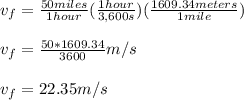
Physics, 07.06.2020 01:58 Magalaki1926
Cheetahs, the fastest of the great cats, can reach 50.0 miles/hour in 2.22 s starting from rest. Assuming that they have constant acceleration throughout that time, find their acceleration in meters per second squared.

Answers: 3


Other questions on the subject: Physics

Physics, 21.06.2019 21:30, canyonrico05
One day, after pulling down your window shade, you notice that sunlight is passing through a pinhole in the shade and making a small patch of light on the far wall. you see that the patch of light seems to be a circular diffraction pattern. it appears that the central maximum is about 1 cm across and you estimate that the distance from the window shade to the wall is about 3 m. what is (a) the average wavelength of sunlight? (b) the diameter of the pinhole?
Answers: 3


Physics, 22.06.2019 10:00, blackjack73
The rocket is fired vertically and tracked by the radar station shown. when θ reaches 66°, other corresponding measurements give the values r = 32700 ft, r¨ = 85 ft/sec2, and θ˙ = 0.019 rad/sec. calculate the magnitudes of the velocity and acceleration of the rocket at this position.
Answers: 3
You know the right answer?
Cheetahs, the fastest of the great cats, can reach 50.0 miles/hour in 2.22 s starting from rest. Ass...
Questions in other subjects:



English, 02.03.2021 22:30



English, 02.03.2021 22:30

Mathematics, 02.03.2021 22:30




 (starts from rest)
(starts from rest)

 , we nees to convert the speed to meters per second:
, we nees to convert the speed to meters per second:




